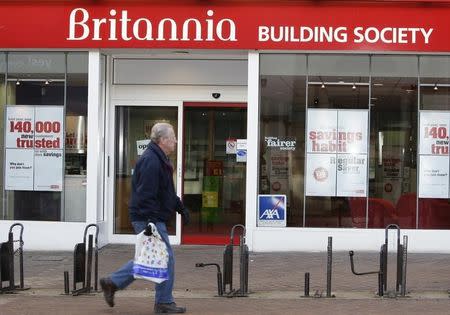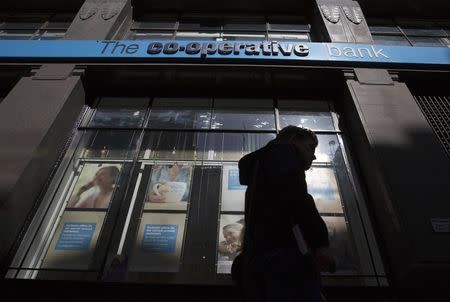Co-operative Bank downfall blamed on Britannia takeover
By Matt Scuffham LONDON (Reuters) - The root of the problems which led to the near collapse of Britain's Co-operative Bank lay in its 2009 takeover of the Britannia Building Society and poor management controls, an independent review commissioned by the bank concluded. Co-op Bank came close to collapse last year after a 1.5 billion pound capital shortfall was exposed, before a recapitalisation saw it fall under the control of bondholders including U.S. hedge funds. The bank's new management asked Christopher Kelly, previously a senior official within Britain's finance ministry, to examine the events that led to the funding gap in July last year. "The roots of the shortfall lie in a merger between the bank and the Britannia Building Society which should probably never have happened. Both organisations had problems. Bringing them together exacerbated those problems," Kelly said on Wednesday. The bank, which has 4.7 million customers, hit trouble after racking up big losses on commercial property, many of which were acquired through the Britannia takeover, which was supposed to create a "super-mutual" able to compete with Britain's biggest high street banks. Kelly said his report, based on 130 interviews with current and former employees and written evidence from a number of individuals and organisations, told "a sorry story of failings in management and governance on many levels". The report said Co-op Bank's board had failed in its oversight of management and failed to properly manage capital and risk. Co-op Bank said on Wednesday it broadly accepted the report's findings. "On behalf of the bank I would like to apologise for these past failings," said Co-op Bank Chief Executive Niall Booker. "The board will consider the implications of today's report and, bearing in mind the various external investigations into the same past events which are still ongoing, consider what action it should take, after taking appropriate professional advice," he added. Co-op Group said the report laid bare the failings of management and governance that caused the bank's problems. "It is a sobering assessment which shows clearly that the Co-operative Group's loss of control of its bank could have been avoided. The management that instigated this disaster for the group are no longer in place; the flawed governance structure that failed to apply the right checks and balances, however, remains," said Interim Chief Executive Richard Pennycook. The Co-operative Group, which now owns just 30 percent of the bank, made a loss of 2.5 billion pounds in 2013, capping the worst 12 months in the mutual's 150-year-old history and the group's new management is battling to convince members of the need for radical reform. Efforts to reform the Co-op had been led by former chief executive Euan Sutherland and senior independent director Paul Myners; but both quit in the face of resistance to their drive to modernise the customer-owned group and bring a commercial focus to its decision making. Members are due to vote on proposed reforms at the bank's annual meeting next month. A number of other inquiries into the Co-op's problems are ongoing, including a governance review by Myners which is due to be published shortly and a review by Britain's financial regulator. "Christopher Kelly's conclusions must strengthen our collective resolve, underlining as they do the urgency of the need for far-reaching fundamental change. We must ensure the mistakes of the past are never again repeated," said Co-op Group's Chairwoman Ursula Lidbetter. Co-op Bank also said on Wednesday that it had appointed Ernst & Young LLP as its new auditors, replacing KPMG, which had been the bank's auditor for the past 40 years. In his report, Kelly said the bank had a tendency "to seek ways of favouring short term financial performance and capital where the bank believed the letter of accounting rules allowed it to do so, even if that was not fully within their spirit". Co-op Bank said earlier this year it had put its external audit services contract out to tender and that KPMG had not entered the process. (Refiles with full name of bank's new auditor) (Editing by Paul Sandle and Ralph Boulton)



